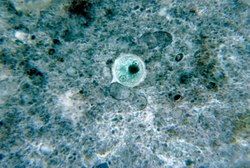(e.g., Dictyosteliida). Each sorocarp consists of both a sorophore (stalk) and a sorus. Sorocarps release spores. "Sorocarp — definition, examples, related...
730 bytes (62 words) - 01:32, 9 October 2024
fruiting stage. The fruiting body of the genus has a unique shape, as its sorocarp resembles a volcano and sorus looks like a ball of hot lava emerging from...
14 KB (1,913 words) - 14:14, 1 July 2024
slug which crawls to an open lit place and grows into a fruiting body, a sorocarp. Some of the amoebae become spores to begin the next generation, but others...
54 KB (5,529 words) - 17:57, 4 April 2025
fern. The indusia have opened, revealing the sporangia. Scale bar, 1 mm Sorocarp DiversityOfLife – Fern identification tool. Encyclopædia Britannica: sorus...
3 KB (289 words) - 12:22, 2 March 2025
protists that behave as slime molds and develop fruiting bodies, either as sorocarps or as sporocarps. It is a monophyletic group or clade within the phylum...
15 KB (1,509 words) - 03:54, 1 March 2025
Acrasis kona (section Sorocarp formation)
an extracellular slime sheath and begin developing into a multicellular sorocarp. The resulting fruiting body undergoes complex morphogenesis, including...
10 KB (1,128 words) - 11:54, 6 February 2025
to migrate. Under the correct circumstances the grex matures forming a sorocarp (fruiting body) with a stalk supporting one or more sori (balls of spores)...
18 KB (1,793 words) - 14:00, 31 January 2025
sorocyst is an encysted cell of a single type found on the sorocarp. The sorocysts along the sorocarps can be arranged in a column or in more complex forms...
9 KB (1,138 words) - 21:04, 16 July 2024
amoebae or 'gymnamoebae' (such as Amoeba itself), among which is a genus of sorocarp-forming slime moulds, Copromyxa. Some gymnamoebae are important pathogens...
215 KB (23,024 words) - 18:34, 16 April 2025
protist known for its unique multicellular fruiting structures called sorocarps. It exhibits a form of aggregative multicellularity and utilizes filose...
6 KB (665 words) - 15:53, 6 March 2025
Sporocarp (ferns), specialized spore-producing structure found in some ferns Sorocarp, the fruiting body of certain cellular slime moulds This disambiguation...
336 bytes (74 words) - 16:08, 31 October 2021
life cycle of D. discoideum begins when spores are released from a mature sorocarp (fruiting body). Myxamoebae hatch from the spores under warm and moist...
40 KB (5,243 words) - 13:36, 9 February 2025
this species changes shape continuously as if it were dancing. L. hula sorocarps have an average height of 23.7 μm and are made up of a single spore and...
3 KB (298 words) - 05:52, 4 January 2024
multicellularity has evolved to generate "fungi-like" fruiting bodies called sorocarps, similarly to slime moulds such as Dictyostelium. The helkesid amoebae...
14 KB (1,315 words) - 17:01, 20 September 2024










